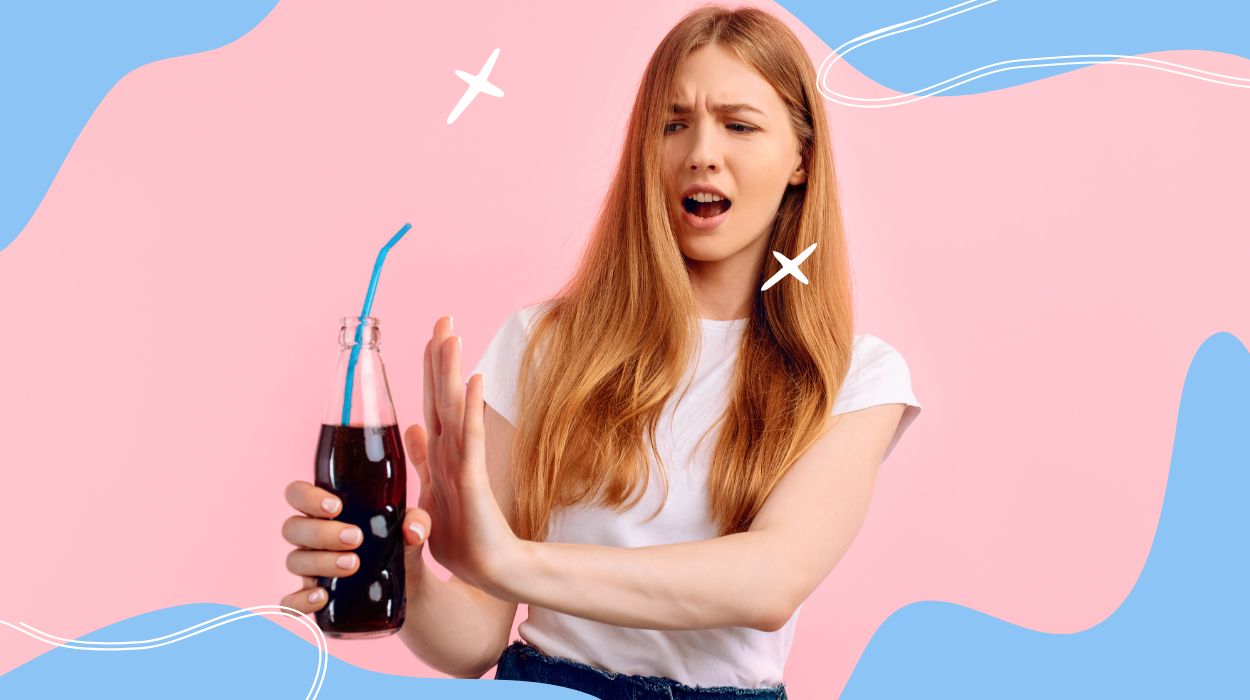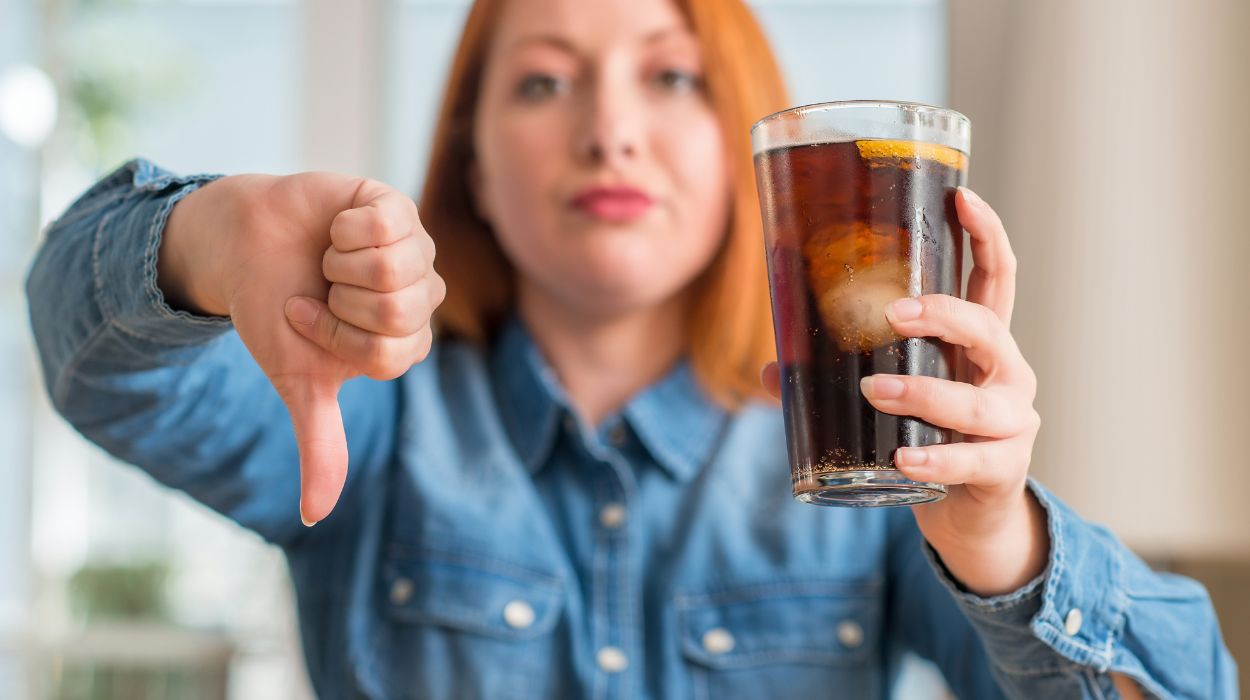Will I Lose Weight If I Stop Drinking Soda? 2024

Do you have a habit of drinking a can of soda or soft drinks every day with your lunch or evening meal? Perhaps you feel peckish at particular times during the day and find yourself craving a sugary drink. You are not alone. According to the Centers for Disease Control and Prevention (CDC), more than 50 percent of the US population drinks at least one soft drink per day,[1]. You might not realize it, but the sugar and calorie content in sugary beverages are recipes for gaining weight. Read on to find out how too much sugar can affect your body, how you can curb cravings if you’re trying to lose weight, especially answer the question ”Will I lose weight if I stop drinking soda?”
If you want to lose weight within a quick time frame, you might want to check out the fast diet. Moreover, you might also want to see if you can take supplements, CBD for weight loss, or suppress your appetite and sweet cravings.
Will You Lose Weight If You Stop Drinking Soda?
Sodas are typically energy-dense, and high in sugar and calories. The average soda can is 330 millimeters (around 12 ounces) and can contain between 30 to 45 grams of sugar, depending on the actual product. Accordingly, you’re likely gaining an excess of around 15 pounds a year from drinking one can of Coke each day – without even realizing it. However, if you eliminate 1 can of soft drink per day, you can potentially prevent 15 pounds of weight gain without other forms of diet control or exercise.
Will Cutting Out Soda Make You Lose Weight?
According to the CDC, 5 percent of the US population consumes over four cans of soda each day,[1] – that’s equivalent to over a staggering 500 empty calories per day – which simply isn’t healthy.
With that in mind, if you’re only drinking one can every day, you might think it’s acceptable. But it’s worth knowing that you can accumulate over 1000 calories per week simply by drinking one can of soda daily, totaling over 50,000 calories in one year.
In other words, you’re likely gaining an excess of around 15 pounds a year from drinking one can of Coke each day – without even realizing it. But the good news is that eliminating that one can of soft drink each day potentially prevents 15 pounds of weight gain without other forms of diet control or exercise.
If you’re currently drinking at least three cans of soda a day, then triple that value. By slowly eliminating your soda habit from your diet entirely, you’ll benefit by essentially preventing 45 pounds of weight gain per year, reducing your chances of obesity.

How Long Does It Take To Start Losing Weight After Quitting Soda?
How much weight you will lose and the timing depends on how much soda or soft drink you consume per day, the amount you are cutting back on, and if you’re actively on other diets or exercise regimes to help you lose weight. Typically if you drink one can of soda daily, you’re setting yourself up for around 15 pounds of weight gain per year.
Sodas and soft drinks are staples in the American diet but are often empty calories. So if you’re trying to shed some weight, stopping your soda habit is an excellent place to start.
Sugar and Calorie Content In Sodas
Sodas are typically energy-dense, high in sugar and calories – the perfect recipe for gaining weight and deteriorating your overall health. The average soda can is 330 millimeters (around 12 ounces) and can contain between 30 to 45 grams of sugar, depending on the actual product.
According to the American Heart Association (AHA), the daily added sugar limit,[2] for men is no more than 36 grams (9 teaspoons) and 25 grams (6 teaspoons) for women. So one can of soda already fills our sugar quota for the day without even consuming anything else.
A typical can of soda, such as Coke, contains between 120 to 160 calories, with an average of around 150 calories. When you want to lose weight, you want to consume fewer calories than your expenditure. This way, your body taps into your fat deposits and starts to burn fat as energy for your body.
How To Stop Drinking Soda To Lose Weight?
So you’ve finally convinced yourself to replace your soda habits. Depending on how much soda you drink, you might feel the effects of soda withdrawal, which include:
- Sugar cravings: You might feel the constant need to eat or drink something sugary to curb cravings.
- Caffeine withdrawal symptoms: If you usually drink a few cans of soda a day, then you might get withdrawal effects,[3] like headaches, anxiety, and tiredness, but these eventually subside within a week or so of stopping.
To avoid or minimize the effects of soda withdrawal, make sure you slowly cut back on soft drinks rather than eliminate them entirely and drink plenty of water to prevent dehydration.
Here are a few ways to help you curb sugar cravings from soda withdrawal.
Keep Hydrated
If you’re parched and dehydrated, the first thing you want to do might be quench it by grabbing a can of soda. But stop – try drinking a glass of water first. Not only does water keep you hydrated, but it can curb cravings, so you might not feel like a soda afterward.
If you’re looking for that fizzy feeling down your throat, then a good alternative to soda is sparkling water which can still provide the fizz but with no sugar or calories.
Keep Hunger At Bay
Sometimes you might crave a soda when in fact, you’re hungry for food. Try to avoid getting too hungry by eating regular healthy meals throughout the day, and adding healthy snacks in between.
Choose high-protein and high-fiber food for meals, which enhances satiety and makes you feel full for longer. This way, you’re less likely to feel like eating and grabbing that can of soda, aiding weight loss.
Choose Sensible Snacks
When you’re trying to cut down on soda, it’s natural to get sugar cravings. But instead of succumbing, you can choose to eat healthy foods that are both sweet and have higher levels of nutrients than a can of soda.
Healthier sweet foods include:
- Low-fat yogurt
- Fruits (apples, pears, grapes, berries)
- Sugar-free chewing gum: Studies show that chewing gum may help to control appetite and reduce cravings,[4].
The Reasons Why You Need To Stop Drinking Soda
If you drink the occasional Coke, that’s probably not a sign of concern. But if you’re drinking particularly more than one can daily, you might want to see what happens and how it affects your health.
Most of the sugar used in making these beverages is high-fructose corn syrup. This substance is cheap, but it is harmful to your overall health; your body may develop an increased resistance to insulin,[5] when consumed in excess quantities.
Here are some after-effects from drinking excessive amounts of soft drinks.
Gain Weight
It is inevitable that consuming too much energy-dense food and drinks with little or no nutritional value in your diet results in weight gain,[6] and possibly obesity.
Feel More Hungry
Your body digests sugary products fairly quickly, causing your blood sugar to rise rapidly. Soon after, your blood sugar drops quickly, due to insulin secretion, which can increase hunger levels.
Leptin is a satiety hormone in our bodies and makes us feel full after we’ve eaten. Studies show that a high level of sugar in the diet reduces the action of leptin, which means we might not feel full even after a big meal. This may result in overeating, leading you to gain weight.
More Likely To Suffer Other Medical Conditions
Research shows a high-sugar diet affects your overall health and increases the risk,[7] of cardiovascular disease, such as high blood pressure and high cholesterol. Too much sugar also increases the risk,[8] of developing type 2 diabetes and increased insulin resistance.
Get Tooth Decay
Carbonated soft drinks contain plenty of sugar and acids that can cause tooth decay,[9]. High acid content from food and beverages can erode the enamel on your teeth, while the sugar causes mineral loss from your teeth.
Develop Health Problems Due To Caffeine
Coke and many carbonated beverages contain caffeine, which acts as a diuretic in your body. This means that your body retains less water and produces more urine – making you dehydrated.
Drinking high-caffeine beverages in large quantities may result in caffeine sensitivity and can disrupt your sleep patterns.
Large amounts of caffeine in your diet can lead to calcium extraction from your body, leaving you with weak bones and at risk of osteoporosis. Studies link high consumption of soft drinks with low bone mineral density,[10] and osteoporosis.
Damage Your Kidneys
Studies show that drinking large amounts of sugary drinks can result in kidney problems, such as kidney stones,[11].
Alternative Drinks After Quitting Soda

There are many alternatives to replacing sugary soda beverages; some healthier options include:
- Sparkling water: Sparkling water is calorie-free, still provides a sparkling sensation, and can be consumed on its own or infused with a bit of fruit juice.
- Lemon juice: Water with some ice and slices of lemon or lime can be refreshing. You can also try to add in mint and cucumber.
- Coconut water: Although coconut water does contain calories, it provides a much higher level of nutrients than sugar-sweetened beverages.
- Herbal or fruit teas: Good examples are green tea, chamomile tea, and peppermint tea.
- Fresh Fruit Juice: Make your own refreshing zesty juice from oranges, limes, and lemons. Watermelon juice is a good thirst quencher.
Try to avoid the following drinks:
- Concentrated Fruit juice: Although these have a higher nutritional value than soda, they still contain high amounts of sugar.
- Diet soda: Perhaps replacing it with diet soda may seem like the next best alternative, but these typically contain artificial sweeteners, such as aspartame and sucralose, which are not particularly good for health. Research shows that high consumption of even diet soda happens to be linked,[12] to kidney damage and an increased,[13] risk of developing type 2 diabetes.
Conclusion
Sugary soda drinks contain high levels of sugar and empty calories. One can of soda on its own fulfills the daily sugar requirements for both men and women.
Drinking too much soda can lead to weight gain, tooth decay, and caffeine-related problems. Too many soft drinks can also lead to an increased appetite, increased risk of bone problems (including osteoporosis), damage to the kidneys, and increased insulin resistance.
Suddenly quitting soda drinks may cause withdrawal symptoms, such as sugar cravings, headaches, irritability, and fatigue.
Try to cut back on soda and sugary drinks slowly, keep yourself hydrated, and avoid being too hungry. Choose sweet, healthy foods like fruits.
Select appropriate alternatives to soda like sparkling water or herbal teas to keep sugar cravings at bay and aid weight loss.
+ 13 sources
Health Canal avoids using tertiary references. We have strict sourcing guidelines and rely on peer-reviewed studies, academic researches from medical associations and institutions. To ensure the accuracy of articles in Health Canal, you can read more about the editorial process here
- Ogden, C., Kit, B., Carroll, M. and Park, S. (2011). Consumption of Sugar Drinks in the United States, 2005-2008 Key findings. [online] Available at: https://www.cdc.gov/nchs/data/databriefs/db71.pdf.
- Ogden, C., Kit, B., Carroll, M. and Park, S. (2011). Consumption of Sugar Drinks in the United States, 2005-2008 Key findings. [online] Available at: https://www.cdc.gov/nchs/data/databriefs/db71.pdf.
- Sajadi-Ernazarova, K.R., Anderson, J., Aayush Dhakal and Hamilton, R.J. (2022). Caffeine Withdrawal. [online] Nih.gov. Available at: https://www.ncbi.nlm.nih.gov/books/NBK430790/.
- Ikeda, A., Miyamoto, J.J., Usui, N., Taira, M. and Moriyama, K. (2018). Chewing Stimulation Reduces Appetite Ratings and Attentional Bias toward Visual Food Stimuli in Healthy-Weight Individuals. [online] 9. doi:https://doi.org/10.3389/fpsyg.2018.00099.
- Amaral, C., Geraldo, Maria Lúcia Pedrosa and Silva, M. (2015). Health Implications of High-Fructose Intake and Current Research. [online] 6(6), pp.729–737. doi:https://doi.org/10.3945/an.114.008144.
- Katzmarzyk, P.T., Broyles, S.T., Champagne, C.M., Chaput, J.-P., Mikael Fogelholm, Hu, G., Kuriyan, R., Kurpad, A.V., Lambert, E.V., Maia, J., Matsudo, V., Olds, T., Onywera, V., Sarmiento, O.L., Standage, M., Tremblay, M.S., Catrine Tudor-Locke and Zhao, P. (2016). Relationship between Soft Drink Consumption and Obesity in 9–11 Years Old Children in a Multi-National Study. [online] 8(12), pp.770–770. doi:https://doi.org/10.3390/nu8120770.
- Stanhope, K.L. (2015). Sugar consumption, metabolic disease and obesity: The state of the controversy. [online] 53(1), pp.52–67. doi:https://doi.org/10.3109/10408363.2015.1084990.
- Malik, V.S., Popkin, B.M., Bray, G.A., Jean-Pierre Després, Willett, W.C. and Hu, F.B. (2010). Sugar-Sweetened Beverages and Risk of Metabolic Syndrome and Type 2 Diabetes. [online] 33(11), pp.2477–2483. doi:https://doi.org/10.2337/dc10-1079.
- Cheng, R., Yang, H., Shao, M., Hu, T. and Zhou, X. (2009). Dental erosion and severe tooth decay related to soft drinks: a case report and literature review. [online] 10(5), pp.395–399. doi:https://doi.org/10.1631/jzus.b0820245.
- Supplee, J.D., Duncan, G.E., Bruemmer, B., Goldberg, J., Yang Jing Wen and Henderson, J.P. (2011). Soda intake and osteoporosis risk in postmenopausal American-Indian women. [online] 14(11), pp.1900–1906. doi:https://doi.org/10.1017/s136898001000337x.
- Ferraro, P., Taylor, E., Gambaro, G. and Curhan, G.C. (2013). Soda and Other Beverages and the Risk of Kidney Stones. [online] 8(8), pp.1389–1395. doi:https://doi.org/10.2215/cjn.11661112.
- Rebholz, C.M., Coresh, J., Steffen, L.M., Crews, D.C., Cheryl A.M. Anderson, Bazzano, L.A., Coresh, J. and Appel, L.J. (2016). Diet Soda Consumption and Risk of Incident End Stage Renal Disease. [online] 12(1), pp.79–86. doi:https://doi.org/10.2215/cjn.03390316.
- Gardener, H., Moon, Y.P., Tatjana Rundek, Mitchell S.V. Elkind and Sacco, R.L. (2018). Diet Soda and Sugar-Sweetened Soda Consumption in Relation to Incident Diabetes in the Northern Manhattan Study. [online] 2(5), pp.nzy008–nzy008. doi:https://doi.org/10.1093/cdn/nzy008.



